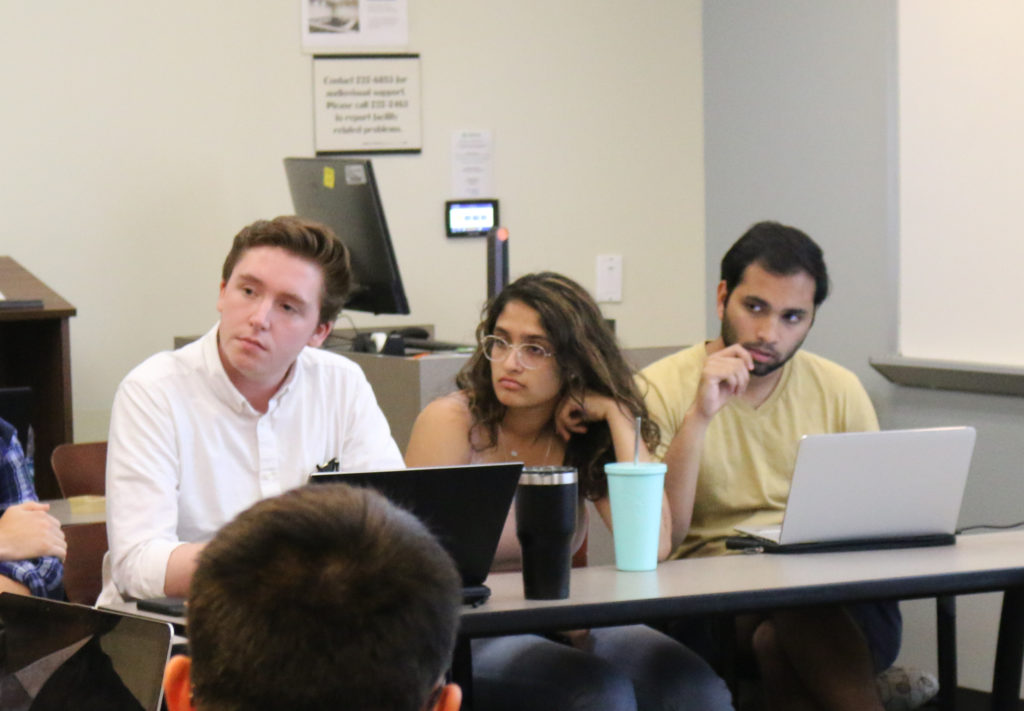
Left to right: College Council co-Chief of Staff Jacob Hicks (18Ox, 20C), President Radhika Kadakia (20C), Vice President Hemal Prasad (19C)./ Nadya Awino, Contributing
Student Government Association (SGA) Attorney General Kaia Ordal (17Ox, 19C) said on Friday that she plans to meet with the Constitutional Council in the coming week regarding College Council’s closed-door legislative sessions.
College Council began entering “executive sessions” to privately discuss and vote on club funding bills after the Wheel began regularly sending a reporter to cover its meetings. Information discussed in executive session is closed to the public, including the contents of bills that College Council discusses and votes on.
College Council leadership said the closed executive sessions are intended to “protect clubs.”
While Ordal acknowledged that sometimes budgetary information can be sensitive, the attorney general called for an open student government.
“It’s important that College Council tries to uphold the highest level of transparency they can while still protecting the sensitive nature of budgetary information,” Ordal wrote in an Oct. 26 email to the Wheel.
Ordal left open the possibility that she would file a formal challenge to the Constitutional Council against College Council.
“I cannot say for certain,” Ordal wrote when asked if she was considering bringing a case to the Constitutional Council, which hears and decides questions of constitutionality.
College Council President Radhika Kadakia (20C) and Vice President Hemal Prasad (19C) did not immediately respond to a request for comment, but they previously defended their use of closed-door legislative sessions by citing Robert’s Rules of Order, which allows for private executive sessions. Co-Chief of Staff Jacob Hicks (18Ox, 20C) said College Council passed Robert’s Rules of Order as parliamentary procedure in Spring 1971, but when the Wheel requested College Council’s governing documents, Hicks emailed a “Rules of Procedure” passed in March 2014 that makes no mention of Robert’s Rules of Order or executive sessions. Instead, on the first page, it states that “any student … shall be admitted to the legislature galley.”
Jane Wang (22C), who serves as one of four justices on the Constitutional Council and also as a College Council freshman legislator, wrote in an Oct. 26 email to the Wheel that she would recuse herself from next week’s conversations with Ordal.
“When I took the position on Constitutional Council, I said that I would gladly recuse myself if a conflict of interest came up,” Wang wrote. “I regard the complaint against College Council as exactly that, so yes, I will be recusing myself.”
Ordal said she “wholeheartedly agree[s]” with Jonathan Lung (20C)’s statement in Wednesday’s Wheel article that detailed College Council’s restriction of public access.
“I encourage them to find another way to be more transparent while in the interest of protecting the integrity of the budgets of the clubs,” Lung told the Wheel. “I want them to be honest.”
SGA President Dwight Ma (17Ox, 19C) told the Wheel earlier this week that he planned to continue allowing College Council to decide whether its meetings are public. Ma said any student who feels “uncomfortable” with College Council’s practices can file a challenge with the Constitutional Council on their own.
The post Attorney General Concerned About College Council’s ‘Executive Sessions’ appeared first on The Emory Wheel.
